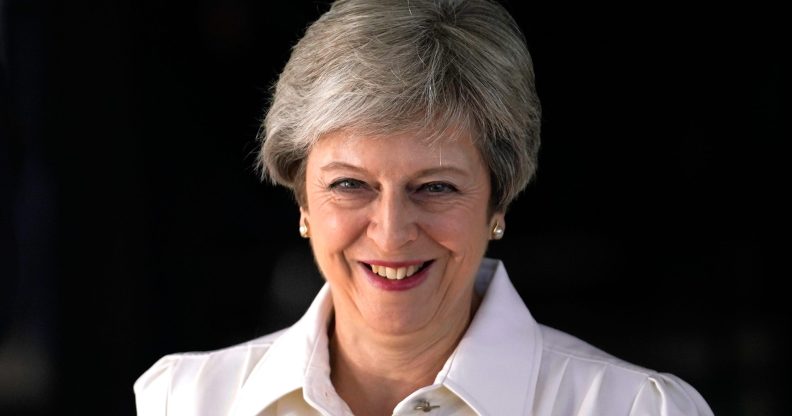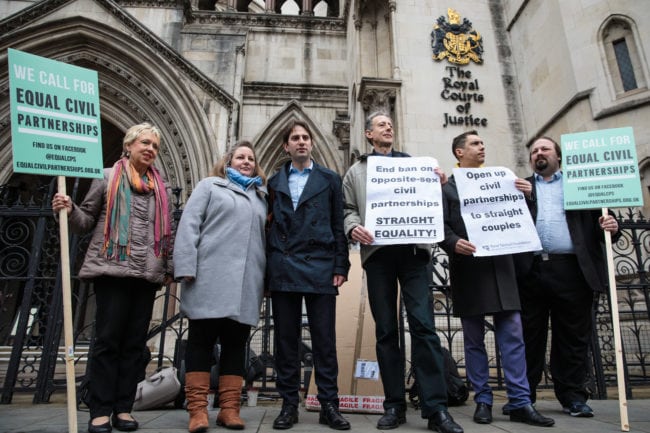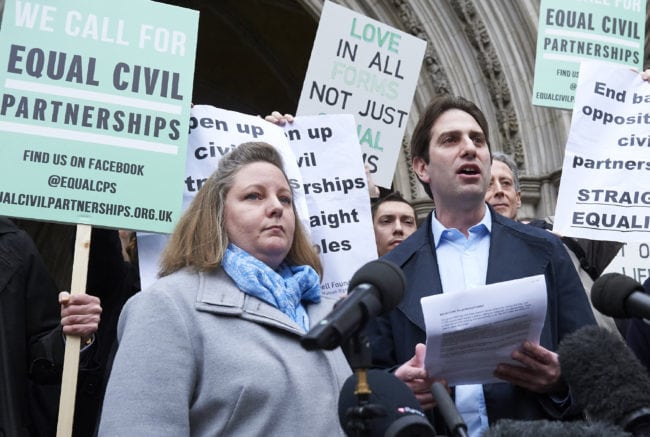Civil partnerships to be opened to straight couples

British Prime Minister Theresa May (Christopher Furlong/Getty)
Civil partnerships will be opened to straight couples as an alternative to marriage, the government has announced.
Tony Blair’s Labour government introduced civil partnerships in 2004 as a segregated form of union for same-sex couples, separate from marriage.
The system was left in place when equal marriage was introduced in England and Wales in 2013, but in June 2018, the UK’s Supreme Court ruled that it was unlawful to prevent straight couples from entering civil partnerships.
The government has now announced that civil partnerships would be opened up to all, permitting heterosexual couples to enter them for the first time.
Prime Minister Theresa May announced the move in an interview with London’s Evening Standard at the Conservative Party conference in Birmingham.
She said: “This change in the law helps protect the interests of opposite-sex couples who want to commit, want to formalise their relationship but don’t necessarily want to get married.
“As Home Secretary, I was proud to sponsor the legislation that created equal marriage. Now, by extending civil partnerships, we are making sure that all couples, be they same-sex or opposite-sex, are given the same choices in life.”

Heterosexual civil partnership campaigners including Peter Tatchell, Charles Keidan and Rebecca Steinfeld, pictured in February 2017 outside the Royal Courts of Justice in London. (Jack Taylor/Getty Images)
Equalities Minister Penny Mordaunt, also quoted in the article, said it was “an important step forward for equality,” and said legislation would go before Parliament “as swiftly as possible.”
She said: “There are all sorts of reasons why people may choose not to marry. By giving couples this option we hope to give them and their families more certainty and security.”
Marriage and civil partnerships are largely identical in British law, although marriages are more likely to be recognised internationally.
There had been question marks about whether the civil partnership system would be slowly phased out of law, after the number of same-sex couples forming partnerships plummeted, but May’s announcement cements their long-term future.
The Supreme Court ruling that prompted the decision came after a lawsuit brought by straight couple Rebecca Steinfeld and Charles Keidan, who argued that the current law discriminates against them.

Rebecca Steinfeld and her partner Charles Keidan. (NIKLAS HALLE’N/AFP/Getty)
In a statement they said: “This is a step in the right direction, but we will only celebrate when legislation is agreed and the Government confirms the date for when the first different-sex civil partnership can take place.
“Change is long overdue. We’ve been struggling for four long years to open civil partnerships to all for the millions of couples like us who want legal recognition and financial protection for their relationship.
“Now we urge the Government to finish the job so that couples (…) can celebrate their love for each other in a way that is meaningful to them.”
Rights campaigner Peter Tatchell, who has long been campaigning for reform to civil partnership laws, welcomed the news in a statement.
“The planned opening of civil partnerships to opposite-sex couples is wonderful news,” he said, adding: “The government’s decision was a necessary response to the judgement of the highest court in the land.”
The Scottish government recently launched a separate consultation on extending civil partnerships in Scotland following the devolution of powers.
The 2004 Civil Partnership Act applies across the entire UK, while the 2013 Marriage (Same Sex Couples) law applied only in England and Wales, with Scotland passing a separate equal marriage law.
Civil partnerships remain the only form of union open to same-sex couples in Northern Ireland, where gay couples continue to be banned from getting married.

